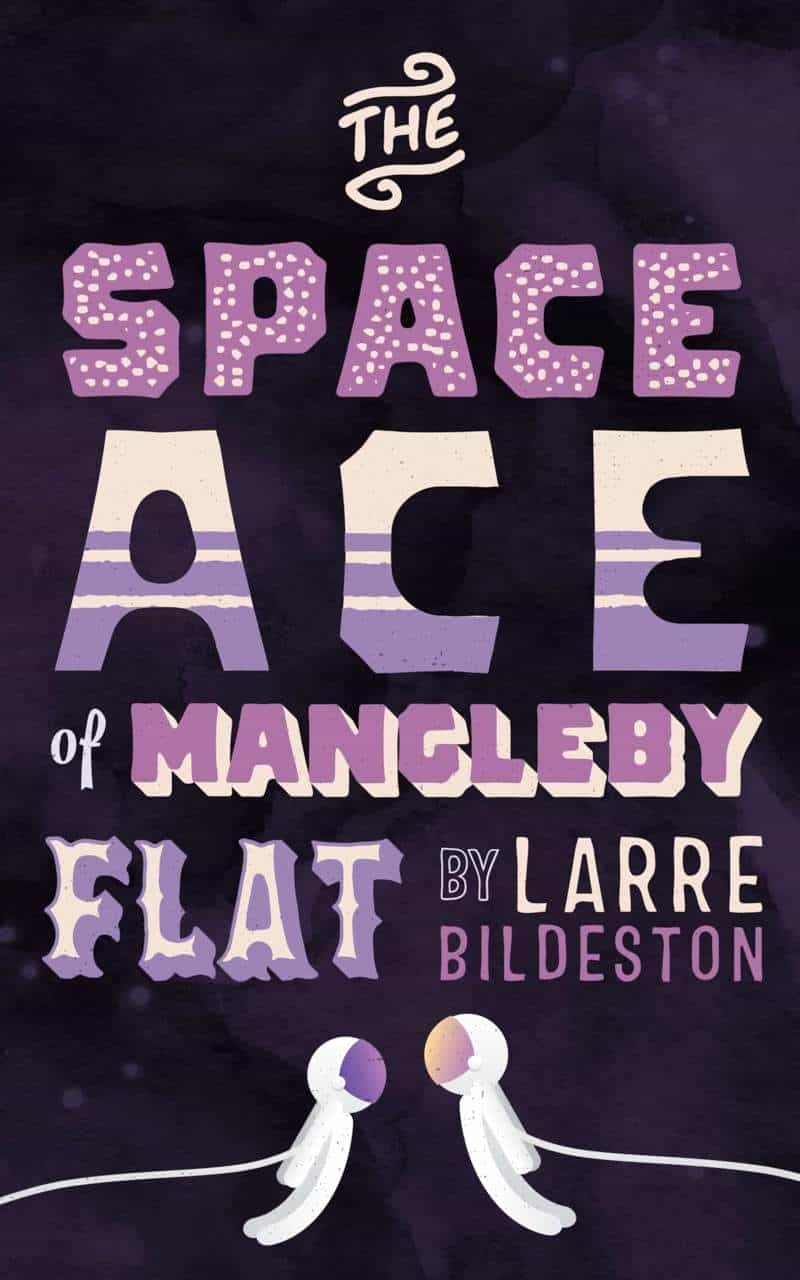“A Little Journey” is a 1951 short story by American author Ray Bradbury, first published in the August 1951 edition of Galaxy Science Fiction Magazine.
This one is available to read for free online.
She’d paid good money to see the inevitable… and then had to work to make it happen!
A group of elderly ladies pays for a tourist trip to Mars where they are promised the chance to board another rocket to meet God. When they realise the connecting flight is not a state-of-the-art piece of equipment but a rickety, dented old thing that looks more like a kettle, one old woman with the symbolic name of Amanda Bellows confronts the owner operator. They go anyway.
This short story can be read literally, or as an allegory for dementia as an elderly woman enters the defamiliarised space of a rest home which, to her, might as well be Mars.
My room is like a cell, the swimming pool is really quite inadequate, and, besides, how many widows who look like mushrooms or skeletons want to swim? And, finally, the whole Restorium smells of boiled cabbage and tennis shoes!”
“A Little Journey” — might as well be describing a nursing home.
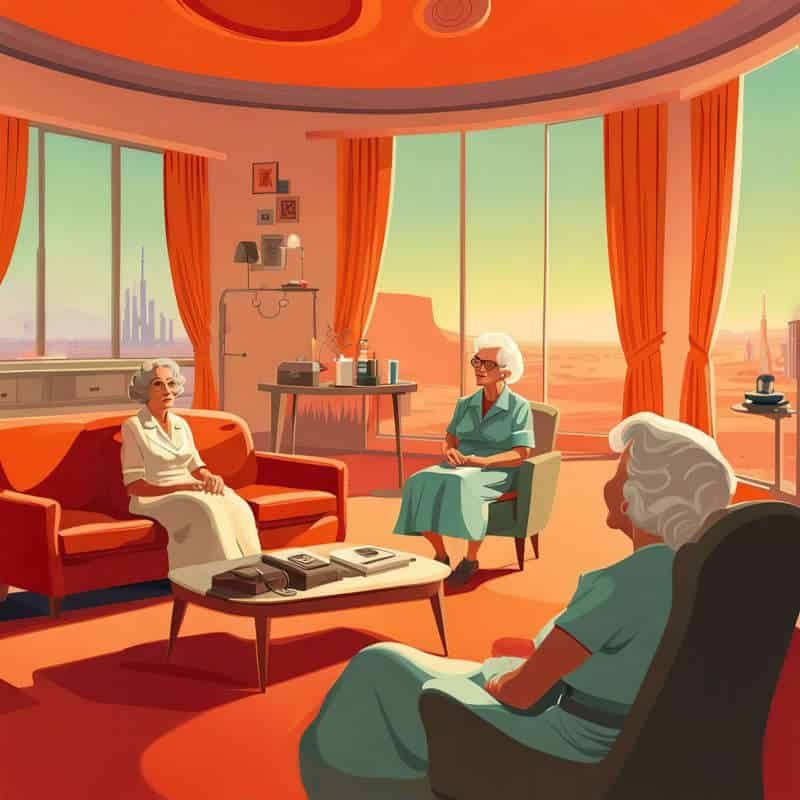

STORY STRUCTURE OF A LITTLE JOURNEY
SHORTCOMING
MRS AMELIA BELLOWES
The story focuses on one tourist, though she is a carbon copy of about 1000 other old ladies. Ray Bradbury underscores this point. When she enters the auditorium she sees herself in all of the other passengers, as if looking into a mirror.
Throughout the story, Ray Bradbury uses the word “rickety” and similar. He first uses it to describe Mrs Bellowes herself. Then she gets into a rickety rocket elevator, then into a rickety rocket ship on Mars.
This suggests Mrs Bellowes is at one with the story world, which suggests the world is coming from within her, which encourages the metaphorical reading in which an ordinary rest home on Earth simply feels like an alien world.
DESIRE
Bradbury sketches Mrs Bellowes’ character as an aged seeker who goes from group to group, always searching for something missing in herself. Although he could have written this more concisely, I sense he had fun with it once he got going:
In her fervor to light a path for her delicate, tottering feet, she had struck matches down dark alleys, and found her way to Hindu mystics who floated their flickering, starry eyelashes over crystal balls. She had walked on the meadow paths with ascetic Indian philosophers imported by daughters-in-spirit of Madame Blavatsky. She had made pilgrimages to California’s stucco jungles to hunt the astrological seer in his natural habitat. She had even consented to signing away the rights to one of her homes in order to be taken into the shouting order of a temple of amazing evangelists who had promised her golden smoke, crystal fire, and the great soft hand of God coming to bear her home.
“A Little Journey”
How might we sketch a 2020s version of the same personality type? Where would such a person go? How would they spend their life?
Finally, at the end of her life, Mrs Bellowes desires the most amazing trip of all: The one to meet her maker.
OPPONENT
MR THIRKELL

In the metaphorical reading of the story, Mr Thirkell could be the guy in charge of the rest home, or the sales person who persuaded Mrs Bellowes’ family to put her into care. If you’ve ever been through the process of investigating care arrangements for an elderly family member, you’ll be well-aware of the difference between what is promised and what is reality. Here in Australia, the entire industry needs investigation. (Journalist Rick Morton is a great person to follow for more information on the topic.)
On the topic of Thirkell’s last name, let me digress.
Thirkell is related to the Scottish and Gaelic name Torquil. The meaning of Thirkell is “Thor’s helmet”.
For no reason other than the coincidence of a shared surname, “Thirkell” puts me in mind of Angela Margaret Thirkell, an English-Australian novelist (1890-1961). From an upper-class British family, she married an Australian at the age of 18, had a couple of kids within a couple of years, then sailed to Australia. Within ten years she begged her godfather to give her and her sons the money for a fare back home. The godfather was J.M. Barrie. Artist Edward Burne-Jones was her grandfather.
She was known to say to potential suitors thereafter, “It’s very peaceful with no husbands.”
Anyway, that Thirkell has nothing to do with Ray Bradbury’s short story, though at the time of publication of “A Little Journey” Angela Thirkell was an old lady like the main characters here. Angela had taken more than one “little journey” in her lifetime, as we might ironically call the arduous trip from one side of the earth to the other before the age of flight.
Bradbury’s Mr Thirkell is the owner operator of the Thirkell Restorium, promising big things to the gullible wealthy.
Rest home owners aside, who might serve as the contemporary equivalent of Mr Thirkell?
Doesn’t the name Stockton Rush sound exactly like a character from a Ray Bradbury short story? (The guy’s full name was Richard Stockton Rush III, which sounds even more like a character from a Ray Bradbury short story to me.)

PLAN
We can never tell if cult leaders believe their own shite. Like domestic abusers, some would be consciously aware of their manipulation tactics whereas others really do believe they’re selling a dream.
In any case, it would seem Mr Thirkell is making a living out of selling end-of-life dreams to old ladies.
Why old ladies (and no old men)? Probably because men die earlier, women marry older men, and there are many more widows than widowers. I suspect Bradbury considers elderly women more vulnerable to bad decisions as well. In 1951 USA, women were still two decades away from owning their own credit cards, so it was the norm to leave all money related things to the husbands. When husbands died, suddenly elderly ladies were required to deal with money for the first time in their lives.
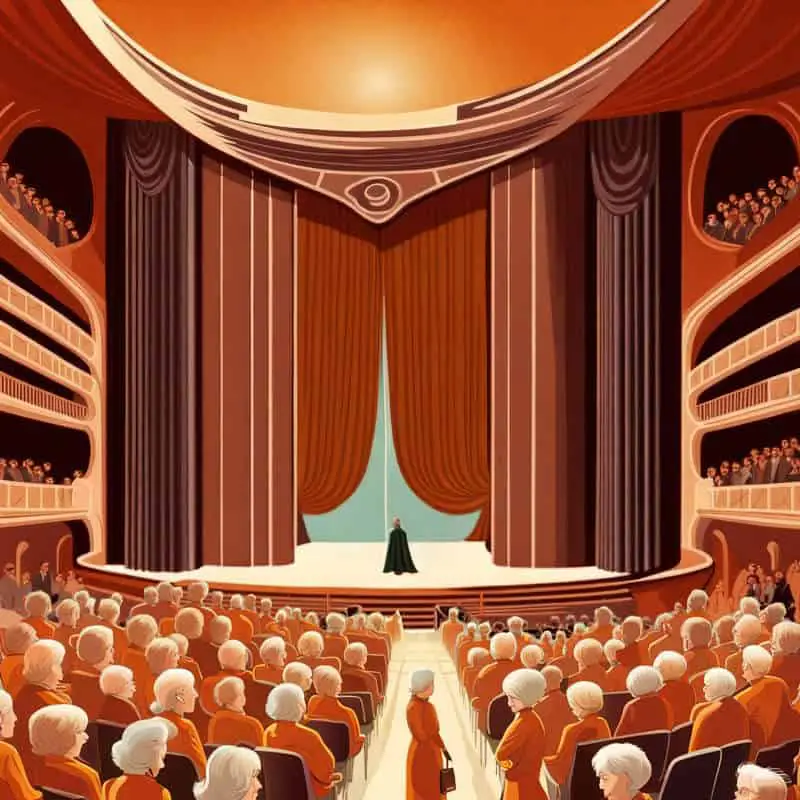
THE BIG STRUGGLE
When the old ladies see the amazing rocket that’s supposed to launch them into space from Mars to see God, readers have it confirmed that this is all a ruse. The cheap bit of metal looks nothing like a rocket.

Refrigerator Moment: Why did Thirkell go to all the expense of transporting the old ladies to Mars? He’s even built a massive building here. For far less outlay he could have made a good-looking rocket and launched straight from Earth. What am I missing here?
I guess Mrs Bellowes knows they’re all going to die on Mars regardless. There’s no hope of making it back to Earth. She doesn’t have any money, though it’s not clear Thirkell even provides a return journey. Surely if anyone returned home, they’d spread the word that the whole thing was a ruse.
So Mrs Bellowes decides not to extend the agony, and demands they board this old tin rocket regardless of how it looks. The other old women join in her protests and the crowd turn into ‘albino cannibals‘. (Albino people have consistently been utilised in fiction as scary and fearsome, which is a problem for those with albinism. Here of course it refers to their grey hair and sallow, elderly complexions.)
Sure enough they’re about to meet their maker. The rocket explodes in the sky.

ANAGNORISIS
So in a nutshell, here’s what happened to Oceangate’s Titan under the sea in 2023:
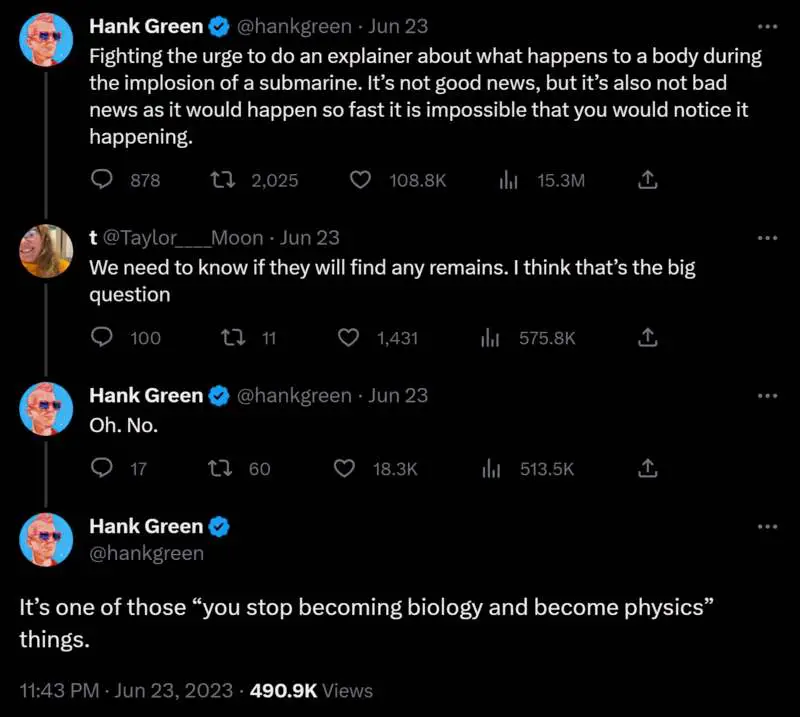
Bradbury’s rocket sounds about as safe as the Titan:
Cyclops Two’s (which would later be renamed Titan) cylinder would be 5 inches thick and made with the miracle material: carbon fiber composite. There was only one problem: carbon fiber hulls for deep ocean craft had never been adequately tested, and consequently, never certified.
The Titan Submersible: A Little Testing Wouldn’t Have Killed Them
These old ladies, too, would ‘become physics’. But since this story is very highly speculative already, Bradbury can end however he wants. The old ladies float around in space until the golden hand of God reaches down to cradle Mrs Bellowes like a human cradles a sparrow.
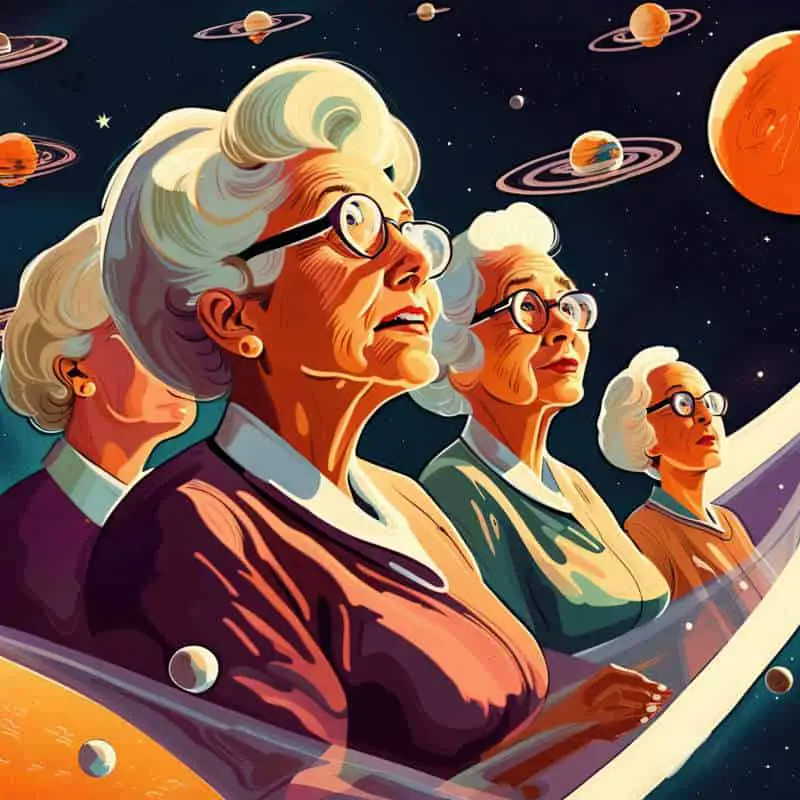
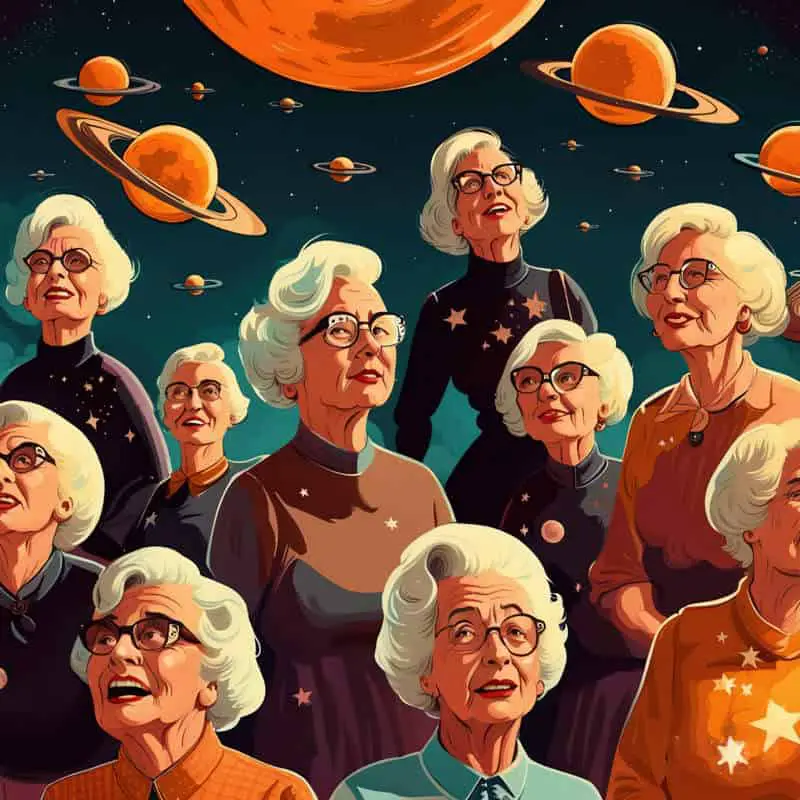
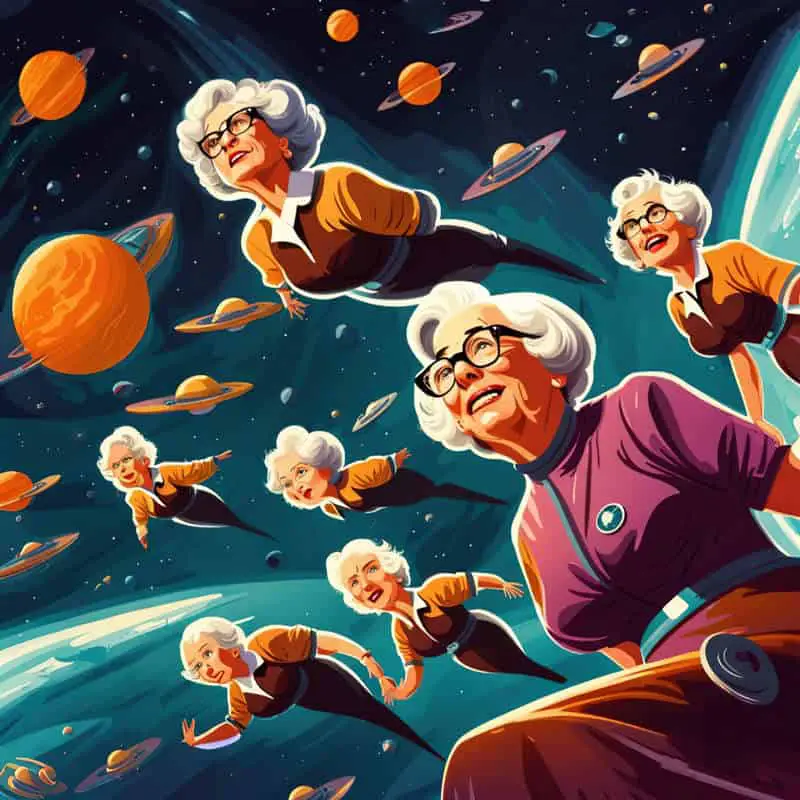

NEW SITUATION
Similar to reading a Flannery O’Connor short story, this ending will hit differently depending on whether the reader is atheist or theist. Of course, the Christian theme has been there from the start. “On the seventh day” (the Biblical day of rest), Mrs Bellowes will also ‘rest’.

Also in 2023, Black Mirror Season 6 was released. Episode 5, “Demon 79” does a similar thing with the ending: Audiences can’t tell until the end whether the main character is hallucinating everything or whether she is the only character in the world who has the truth. The end reveals the truth, which is supernatural rather than mundane.
RESONANCE
I didn’t realise when reading this story that it would be a mid-century, prescient story reminiscent of the Oceangate fiasco, but there we have it. Turns out it’s not so hard to persuade people (at least, enough of them) to go with you on hare-brained adventures which are clearly doomed from the start.
Where Bradbury got it wrong:
Due to the gender economic disparities, women are presently locked out from such adventures. It’s not the elderly ladies who go out and explore new territory, but billionaire white men, and their hapless sons.
Unless one of them is your friend or boss, you should spend 100x less time thinking and talking about billionaires than you currently do.
Less Wrong
Satisfaction comes from the fact that the feisty Mrs Bellowes insisted Thirkell go on the trip with them, exploding like everyone else. He falls down into the Sun, a metaphorical Hell.
The artwork for this post was generated using AI.

